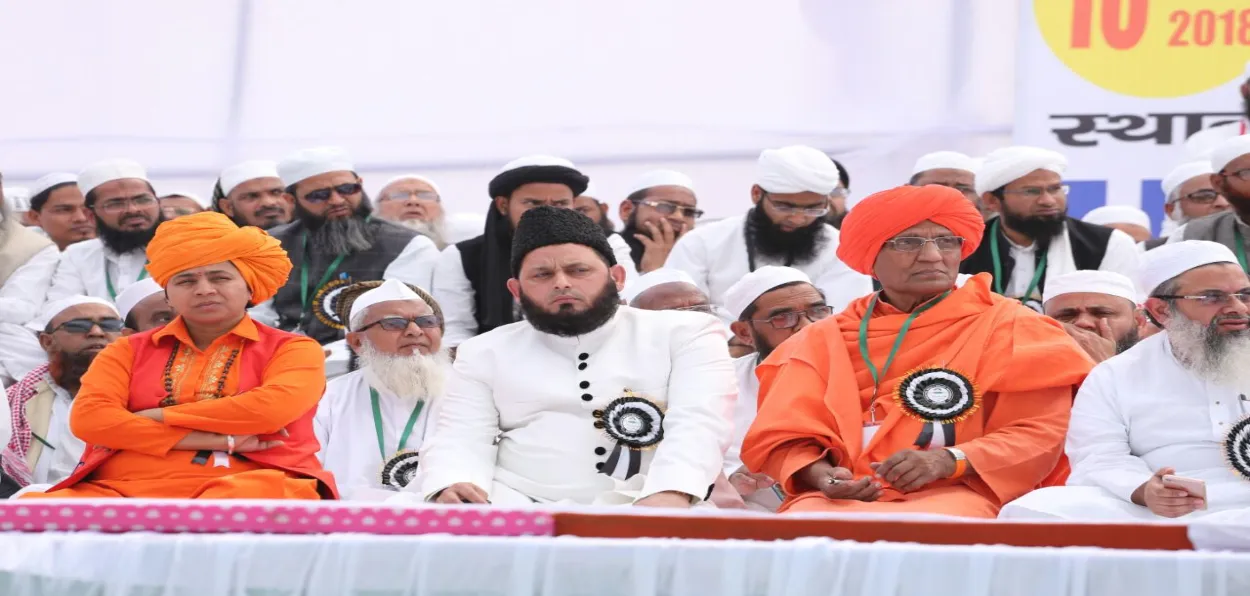Maulana Khalid Rasheed with Arya samaj leader swami Agnivesh at the interfaith meet
Lucknow
In a rare ‘green’ gesture, an Islamic seminary in Lucknow has issued a fatwa (an edict by a recognized religious authority on a point of Islamic law) asking people not to cut trees and burn crops as part of initiatives to curb global warming.
The ‘advisory’ has been issued by the Islamic Centre of India (ICI), on a clarification sought by one Mohammad Tarique Khan given soaring temperatures.
“According to the Quran, it is the religious duty of Muslims to protect greenery, save water, and avoid wastage. Every Muslim must ensure no green trees and crops are set on fire,” said Maulana Khalid Rasheed Farangi Mahali, Chairperson, ICI, in response to Khan’s request.
In a video message, Maulana Khalid Rasheed asked people to plant more saplings and avoid cutting off trees.
“According to the Almighty, the reward is for those who plant saplings that benefit all living creatures, including humans and animals. Make sincere attempts to save ponds, canals, rivers, and seas from getting polluted,” he said while adding, “In Islam, it is forbidden to burn trees and crops. It is a great sin. Even during the war, trees, gardens, and fields should not be burnt or damaged.”
Maulana Khalid Rasheed Farangi Mahali is an influential Muslim leader and also a member of the All India Muslim Personal Law Board (AIMPLB),
A dried up pond in Delhi
In a separate interview with a news agency, Maulana Khalid Rasheed Farangi Mahali says, “The entire country is facing a very big heat wave. Due to this a number of people also have lost their life. And people are suffering to a great extent due to this heat.”
he said, “At our Jama Masjid in Lucknow we offered a special prayer for the relief from this hot summer. And we have prayed to the almighty, to Allah to send some relief so that the temperature may come down.”
Maulana Rasheed belongs to the Ulama-e-Farangi Mahal, the only family in the world to have produced Islamic Scholars consistently for the last about 1,000 years. These Scholars trace their lineage back as far as to the time of the Prophet.
As per the website of the ICI, the ancestors of Farangi Mahlis migrated to India in the 11th Century. The first evidence of the existence of the family lies in a revenue-free grant made to an ancestor Allam Hafiz in 1559.
The Islamic Scholars of this family can be traced through similar documents down to the time in 1692 when the Allama’s great-great grandson, Qutub-ud-din, was murdered at Sehali near Barabanki, Uttar Pradesh.
Emperor Aurangzeb was highly influenced by the Islamic scholars of Farangi Mahal, so when he heard about the murder of Allama Qutub-ud-din Shaheed, he immediately ordered the family of Allama be shifted to a safer place in the city of Lucknow.
ALSO READ: KKR pacer Sakib Hussain’s rise is a story of ambition and grit
Maulana Khalid Rasheed has given several fatwas to guide the community on the right path of humanity and peace. Among his most famous and highly-appreciated fatwas are against terrorism, and female Infanticide and in favour of promoting girls’ education.
Subscribe to Updates
Get the latest creative news from FooBar about art, design and business.


